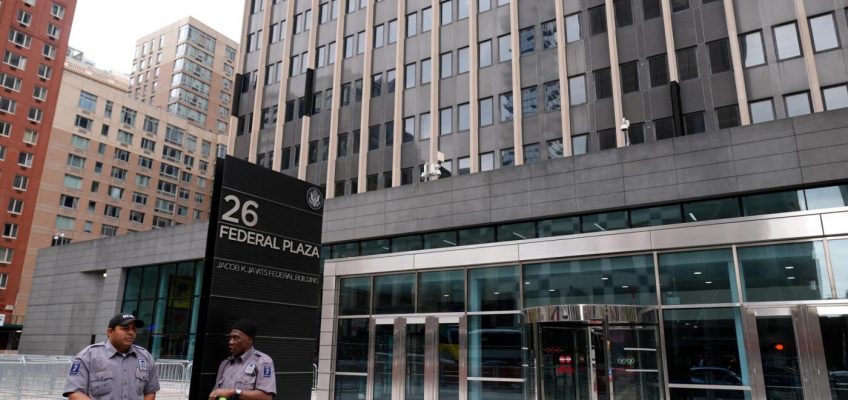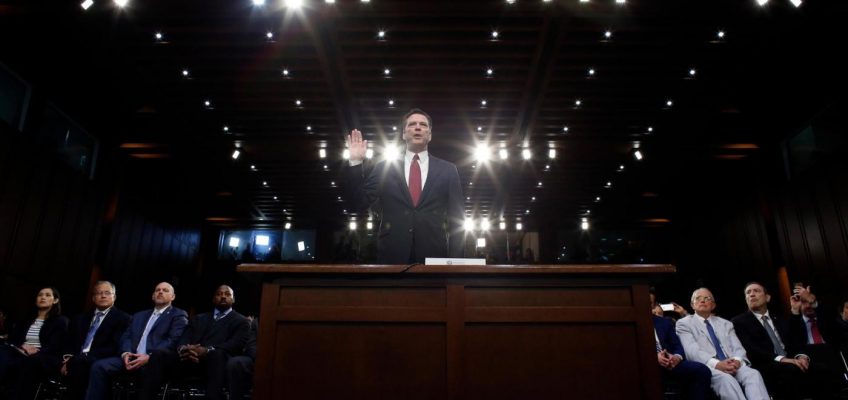President Donald Trump appears to be prodding his administration to seek criminal charges against more targets after a grand jury returned an indictment against foe and former FBI Director James Comey.
“It’s not a list, but I think there’ll be others,” Trump told reporters on Friday as he departed the White House.
He added: “It’s about justice. It’s not revenge.”
Comey is accused of making a false statement to Congress and obstruction of a congressional proceeding back in 2020. He declared his innocence Thursday and said, “Let’s have a trial.”
“My family and I have known for years that there are costs to standing up to Donald Trump,” Comey said in a video posted to Substack.
Comey, who was FBI director from 2013 to 2017, was fired by Trump during the Republican president’s first term amid the government’s probe into allegations of ties between Russian officials and Trump’s 2016 campaign.
John Bolton, who was national security adviser during Trump’s first term before being fired in 2019, is being investigated for his handling of certain documents after leaving government. His lawyer has denied wrongdoing. Like Comey, Bolton wrote a book that portrayed Trump in very unflattering ways.
What was the Russia probe?
Prosecutors led by special counsel Robert Mueller did not establish that Trump or his associates criminally colluded with Russia in 2016, but they found that Trump’s campaign had welcomed Moscow’s assistance.
Trump and his supporters have called the investigation a “hoax” despite multiple government reviews showing Moscow interfered on behalf of the campaign.
Chair of a House committee on China demands urgent White House briefing on TikTok deal
GOP lawmaker with ‘joebidennnn69’ screen name to plead guilty to sharing child sex abuse videos
In a race back to the moon, US and China see a fast-approaching finish line
As the Trump administration and states push health data sharing, familiar challenges surface
States are cutting Medicaid provider payments long before Trump cuts hit
The indictment against Comey, however, doesn’t center on the Russia investigation. It accuses Comey of lying to the Senate Judiciary Committee when he said he had not authorized anyone else at the FBI to be an anonymous source in news reports about a particular investigation.
It appears from the context to refer to an FBI inquiry related to former Secretary of State Hillary Clinton, a Democrat who ran for president against Trump in 2016.
Trump, who has repeatedly called Comey a “bad person,” celebrated the indictment.
“He has been so bad for our Country, for so long, and is now at the beginning of being held responsible for his crimes against our Nation,” the president said on his social media platform.
Rep. Hakeem Jeffries of New York, leader of House Democrats, said the indictment is a “disgraceful attack on the rule of law.”
Comey scorched Trump in book
Comey’s disgust for Trump was laid out in his 2018 memoir, “A Higher Loyalty.”
“This president is unethical, and untethered to truth and institutional values,” Comey wrote. “His leadership is transactional, ego driven and about personal loyalty.”
He recalled a private meeting with Trump early in his first presidency in which Trump demanded allegiance. Comey likened it to a mafia induction.
Earlier this year, the Trump administration said it was investigating a social media post by Comey that Trump and his allies interpreted as a call for violence against the president.
In an Instagram post, Comey wrote “cool shell formation on my beach walk” under a picture of seashells that appeared to form the shapes for “86 47.” The Merriam-Webster dictionary says 86 is slang meaning “to throw out,” “get rid of” or “refuse service to,” and Trump is the 47th president.
Comey deleted the post and said he didn’t know “some folks associate those numbers with violence.”
Family ties
Comey’s daughter was a federal prosecutor for 10 years until she was fired in July by the Justice Department. Maurene Comey is suing to get her job back, saying her dismissal was unconstitutional and connected to Trump’s hostility toward her father.
“If a career prosecutor can be fired without reason, fear may seep into the decisions of those who remain,” Maurene Comey said in a note to her colleagues. “Do not let that happen. Fear is the tool of a tyrant, wielded to suppress independent thought.”
The White House said the decision came from Justice Department officials.
Separately, James Comey’s son-in-law, Troy Edwards, resigned as a federal prosecutor minutes after the former FBI director was indicted.




